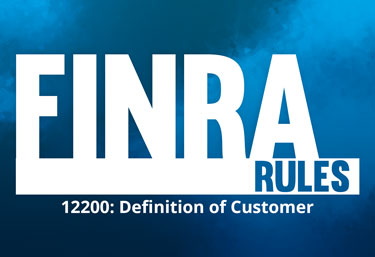The FINRA Definition of Customer

The Financial Industry Regulatory Authority (FINRA) has promulgated many rules that are designed to ensure fairness in the securities industry, protect the rights of investors, and give investors legal options to hold bad acting brokers and brokerages firms accountable.
One of these rules, FINRA Rule 12200, governs when disputes must be arbitrated. Specifically, the rule states that arbitration is mandated under the code if:
- It is required by a written agreement; or
- It is requested by a customer.
Accordingly, in order to understand how this rule operates, one needs to understand the industry and legal definition of the term ‘customer’. Here, our experienced FINRA arbitration lawyers explain who qualifies and who does not qualify as a customer under FINRA Rule 12200.
FINRA Rule 12200 Topics Covered Here
Who is a Customer For Purposes of Rule 12200?
In general, courts take the view that a plaintiff qualifies as a customer under Rule 12200 if they are not a broker or a dealer and they either:
- Have purchased goods or services from a FINRA member; or
- Have an investment or brokerage account with a FINRA member.
In many cases, this definition is easy to apply. For example, if you purchase securities directly through a FINRA member firm, you are unquestionably a customer of that brokerage for the purposes of FINRA Rule 12200. As such, you have the ability to compel arbitration to resolve a dispute. Though, there are some other cases in which it is not necessarily clear if one qualifies as a customer under this definition.
Who Falls Short of the Definition?
The case of Grant v. Rotolante, a dispute originating out of Naples, Florida, provides a good example of scenario in which a Florida Appeals court determined that an investor failed to qualify as a customer, and thus could not compel arbitration.
In this case, Mr. Grant, a registered broker, had a personal friendship with Ms. Rotolante. Ms. Rotolante asked Mr. Grant for investment advice; he obliged and she followed through with his plan. However, at no point did Mr. Grant ever receive any compensation for his services, nor did she open an account with him or buy any securities directly from him or his member firm.
Eventually, Ms. Rotolante sustained massive losses in the 2008 financial crisis, which hit her securities investment particularly hard. She filed a motion to compel FINRA arbitration against Mr. Grant, alleging that his negligence caused her to lose money.
While a FINRA arbitration panel initially awarded her compensation, the award was overturned by the Florida appeals court on the grounds that Ms. Rotolante did not qualify as a customer under Rule 12200. Thus, she had no legal ability to compel arbitration in the first place.
Contact Our Office Today
At Sonn Law Group, we have extensive experience handling complex securities fraud claims. Our entire legal practice is devoted to protecting the rights and interests of investors. For a free review of your case, please do not hesitate to call us today at 844-689-5754. From our primary office in South Florida, we represent wronged investors nationwide.
CONTACT US FOR A FREE CONSULTATION
Se Habla Español
Contact our office today to discuss your case. You can reach us by phone at 844-689-5754 or via e-mail. To send us an e-mail, simply complete and submit the online form below.

